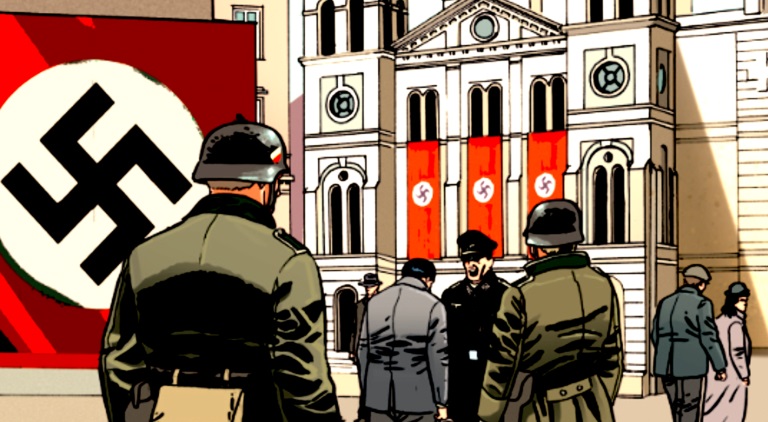Good swastika, bad swastika
“A flag with a swastika flies at the Königsplatz in Munich”, the German media announced. This catchy headline was only meant to attract attention, and the sentences that followed made it clear that nothing improper had happened. The large Nazi flag was hoisted in the city centre for the filming of Munich – Facing War (2021), a historical Netflix super-production with Jeremy Irons in one of the leading roles. The filmmakers wanted to be as faithful as possible to the reality of the autumn of 1938, when the leaders of Germany, Italy, Britain and France met in Munich to decide the fate of Czechoslovakia.
The same goal of accurately depicting historical realities was pursued by the authors of the IPN’s graphic novel Operation ‘Codfish’ (2022), which tells the story of one of the most spectacular actions of the Polish Underground State during the Second World War: helping the Allied war prisoners escape from German camps. Inside, the reader sees flags with swastikas on public buildings in Poznań and Łódź, for this was the grim reality of the occupation.
How great my astonishment was when I learnt that this graphic novel had raised objections from the headteachers of two primary schools in West Germany. Their management reacted allergically also to another IPN comic book, Major Hubal (2021) – the story of the famous Major Henryk Dobrzański, who, in September 1939, neither took off his uniform nor laid down his arms but decided to continue fighting the Germans. A Polish diaspora teacher who wanted to use the IPN’s publications as a teaching aid first faced the absurd accusation that he propagated banned symbols and later that he flaunted brutality. The view of the schools was shared by the Supervisory and Service Directorate (ADD) in Koblenz, the equivalent of the Polish regional Board of Education. The teacher was told that the comic books contained “horrific content” and could not be distributed. So he sent them back to the publisher.
Both graphic novels were created with the utmost care, with the assistance of a historical consultant and two reviewers each. There is no substantive justification for blocking their distribution in German schools. The case smacks of censorship, and it is hard to shake off the feeling that it is not really about swastikas or ‘horrific content’. Rather, it is about the fear of allowing any other Second World War narrative than the one dominant in Germany.
National complacency
The dominant discourse amounts to the thesis: we have nothing to blame ourselves for. According to a 2020 survey by the weekly Die Zeit, more than two-thirds (68 per cent) of our [Poland’s] western neighbours are convinced that “Germany has done a very good job of dealing with its Nazi past and can serve as a model for other countries”. This is a convenient concept but a far cry from the truth.
In reality, the Germans have done very little accounting for the Second World War. Post-war denazification proved so superficial that even in the 1960s, the West German administration was still swarmed with former Nazi Party members and even SS officers. The corporations that grew rich on the slave labour of the Hitler regime continued to increase their wealth during the ‘economic miracle’. War criminals were rarely tried in West or East Germany. Suffice it to say that German courts convicted only two concentration or extermination camp commandants: Paul-Werner Hoppe of Stutthof and Franz Stangel of Sobibor and Treblinka. Germany’s financial responsibility for the enormous war abuses and destruction was also disproportionately small. Today, the government in Berlin won’t even talk about reparations to Poland. Its officials prefer to resort to declarations of ‘moral responsibility’, so readily repeated at successive anniversaries.
However, the execution of moral responsibility isn’t that good either. More than half (58 per cent) of the participants in the aforementioned Die Zeit’s poll agree with the scandalous thesis that “Germany bears no more responsibility for national socialism, dictatorship, wars and crimes than any other countries”. Barely 3 per cent admit that their own family members supported Nazism. But let me remind you that in July 1932, the Nazi Party got over 37 per cent of the vote in the perfectly free Reichstag elections. In total, some 10 million people joined the Nazi party between 1925 and 1945. Almost twice as many passed through the Wehrmacht. By 1944, the printout of Mein Kampf – Adolf Hitler’s racist manifesto – reached nearly 11 million copies.
Today, successive generations of Germans are being brought up in ignorance of the scale of German crimes during the Second World War, and they overestimate German resistance to the Brownshirts’ regime. This is the result of educational neglect but also, in a broader sense, of Berlin’s short-sighted historical policy that mixes empty gestures, complacency and artificial separation between Germans and Nazis. Such an attitude leaves little room for a deeper reflection on their own guilt and a genuine dialogue with Poland. From the country that is our ally and aspires to be the leader of a united Europe, we must demand a great deal more.
Karol Nawrocki
